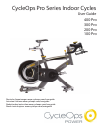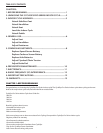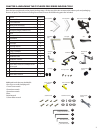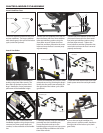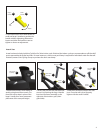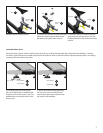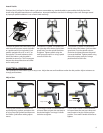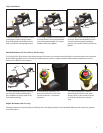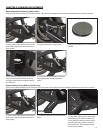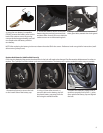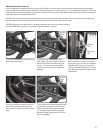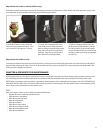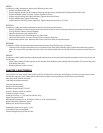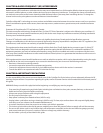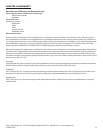
13
CHAPTER 8: RAdio fREqUEnCy (Rf) inTERfEREnCE
Radio frequency (RF) interference with other devices may cause intermittent loss of information. Wireless Internet access points,
microwaves, cordless phones, or other wireless devices may cause frequency interference. To mitigate the chance of interference,
set wireless access points to the lowest channel possible and keep indoor cycles away from interfering devices. To change the
channel on the access point, please consult manufacturer’s documentation.
CycleOps utilizes ANT+ technology to ensure a robust and reliable connection between the various sensors used in our products.
Sensors are defined as power meter sensors, heart rate strap sensors, cadence sensors, speed sensors, and controlled resistance
sensors.
Statement of Compliance for FCC and Industry Canada:
This device complies with Industry Canada and Part 15 of the FCC Rules. Operation is subject to the following two conditions: (1)
This device may not cause harmful interference, and (2) this device must accept any interference received, including interference
that may cause undesired operation.
The term “IC” before the radio certification number only signifies that Industry Canada technical specifications were met.
Changes or modifications to this device not expressly approved by the party responsible for compliance with FCC regulations (the
manufacturer) could void the user authority to operate the equipment.
This equipment has been tested and found to comply with the limits for a Class B digital device, pursuant to part 15 of the FCC
Rules. These limits are designed to provide reasonable protection against harmful interference in a residential installation. This
equipment generates, uses and can radiate radio frequency energy and, if not installed and used in accordance with the instruc-
tions, may cause harmful interference to radio communications. However, there is no guarantee that interference will not occur in
a particular installation.
If this equipment does cause harmful interference to radio or television reception, which can be determined by turning the equip-
ment off and on, the user is encouraged to try to correct the interference by one or more of the following measures:
• Reorient or relocate the receiving antenna.
• Increase the separation between the equipment and receiver.
• Connect the equipment into an outlet on a circuit difference from that to which the receiver is connected.
• Consult the dealer or an experienced radio/TV technician for help.
CHAPTER 9: imPoRTAnT PRECAUTions
It is the responsibility of the owner to ensure that all users of this CycleOps Pro Series indoor cycle are adequately informed of all
warnings and precautions. For questions regarding this guide, contact Customer Service at the number listed on the back panel of
this guide.
WARNING: Always consult with a physician before beginning or modifying any exercise program.
• Stop exercising, if experiencing any kind of pain, including but not limited to: chest pains, nausea, dizziness, or shortness of
breath and consult a physician before continuing.
• Always wear proper footwear while using this equipment.
• Do not jump on the indoor cycle.
• Keep power cord away from heated surfaces (400 Pro only).
• Unplug indoor cycle before moving or cleaning it (400 Pro only). To clean, wipe surfaces down with soap and slightly damp
cloth only; never use solvents (see Preventative Maintenance).
• At no time should more than one person be on indoor cycle while in operation.
• This indoor cycle should not be used by persons weighing more than 300 pounds. Failure to comply will void the warranty.
• Do not use this indoor cycle in any location that is not temperature controlled, such as but not limited to garages, porches,
pool rooms, bathrooms, car ports or outdoors. Failure to comply may void the warranty.
• Use the indoor cycle only as described in this guide.



